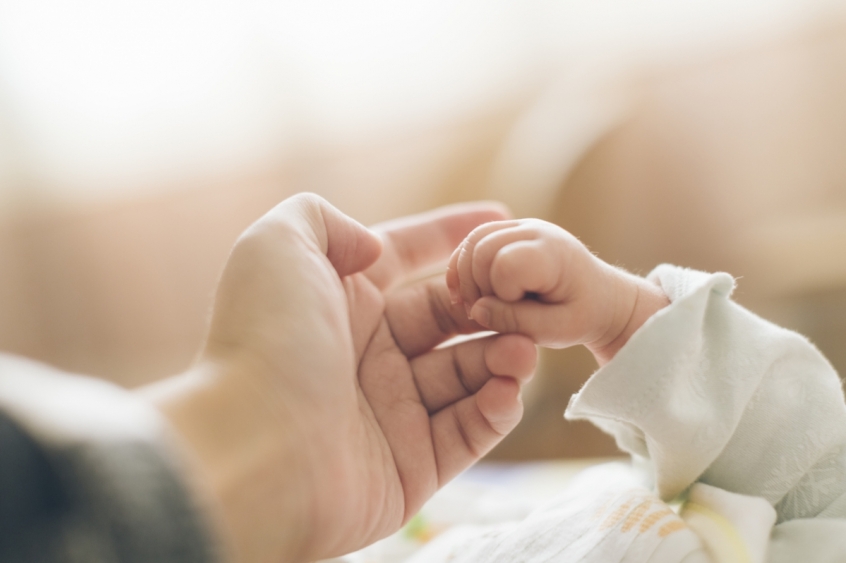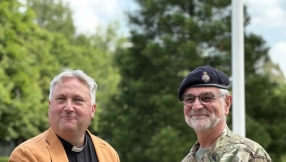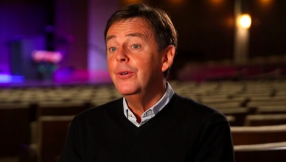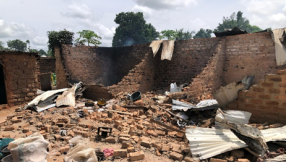
Lucy West in her debut book, The Wait, shares the pain and anguish she and her husband Lindz felt when they were diagnosed with 'unexplained infertility'. After an eight-year journey of trying to start a family, the couple went on to adopt their two 'chosen children', thus fulfilling their dream of becoming parents.
Christian Today spoke with West to hear more about their journey, the misconceptions surrounding infertility, and how the church supported them through their difficult season.
What went through your mind when you were diagnosed with 'unexplained infertility'?
For some people, to be told their infertility is 'unexplained' can feel like an enormous relief. It gives hope that it could still happen if they just keep on trying. Sadly for me, it kind of prolonged the agony, it suddenly threw away any signposts that told me where I was going would someday end and what help we could get, and threw a long empty road ahead of us, with no answers along the way. Strangely, we have been told that we could still get pregnant any day, so there has never quite been closure on it, although I am completely at peace with that now.
The subtitle of your book is 'finding peace when facing the challenge of infertility'. What does peace in the midst of challenging times look like to you?
I remember Bill Johnson from Bethel church preaching once on Jesus sleeping in the boat as a storm raged all around. He talked about how, if we can have peace in the middle of that storm, then the storm ultimately has no power over us. Now, I have huge respect for anyone walking through pain who can declare they have a deep, unexplainable peace. I believe it can just come, but most of the time we have to choose to walk into it, choose to put God first, choose to lift our hands and worship even as they tremble. Not an easy call, but there's far more security in Jesus rather than our difficult circumstances.
You have chosen to share your story because there are still so many misconceptions and misunderstandings surrounding infertility and childlessness. What misconceptions did you encounter?
There is very little understanding about infertility and childlessness if you haven't been through it yourself before. Even walking with someone, I don't think you can ever feel the whole array of emotions, so there are still views held that can be very painful, but I know they only come through a lack of understanding. I felt from comments we heard that some people thought we were putting work first, and that we were being selfish because of this. We had people asking if we had spoken something negative over ourselves so it was our fault we weren't getting pregnant. There were the views that it was embarrassing for us, or awkward for others to talk to us. Like any form of grief, it is too easy for people to cross the road or pretend they haven't seen you in the supermarket (yes, we had that many times, a quick look away and busying themselves with reading a cereal packet!). All of these attitudes I understood, but they did cut us deeply, and I believe it led to me feeling so different to everyone else. This in turn brought a deep sense of shame that clouded a lot of my journey and stripped away so much of who I was, or believed I was, during those difficult years. I would love infertility and childlessness to be talked about more, brought into the open and seen as more 'normal' if you like. I think this would take some of that shame away.
Did you feel supported by your own church and do you feel the wider Church more generally knows how to meet the very specific pastoral needs of women living with infertility?
We were definitely supported by individuals within the church. The pastor and his wife were good friends and prayed with us a lot over those years. I think though, the Church as a whole isn't great at supporting those with differences like we had. The Church is naturally very geared around family as we talk lots about all being part of God's family, and stepping up and supporting people with children as it is a hard job raising them. These are all beautiful things in themselves, but when you are desperate for your own children, any talk of families, or openly celebrating the mothers or fathers' on those special days for example, can be very painful.
There are still subjects that are not regularly addressed by the Church - we are getting better as a whole, but I do believe more testimony should be invited from the front. To hear how someone copes day to day in a wheelchair, for example, gives us insight into how the world is generally not built for those with a disability like that, and how we can help to take away stigmas or physical difficulties.
Talking about childlessness means we address the elephant in the room and allow conversation, rather than others being afraid to go near it. I wish people had talked to me about grief more before this happened to us. I had no idea this would be a type of grieving and would knock us down so hard. I didn't feel I was 'allowed' to grieve as we hadn't lost a physical person. With education, and hearing people's stories of navigating their own pain, we can bring more understanding to the wider population and help people to feel less alone in their struggles.
In your book you document the frustration you felt when your rounds of IVF failed. Frustrations and faith can exist at the same time. How important is it for people to hear this?
It's ever so important! I used to believe that you were either stuck in a valley, climbing a mountain, or enjoying the beautiful views, never stopping for long, always moving to the next part of your journey in life. Now I believe that pain and joy can be waving along at exactly the same time, almost like two roller coasters simultaneously passing each other. I knew that writing my book, I needed to talk about the depths of pain reached, as I wanted to show how resilience and hope can get you through anything, but I knew it would be harder to incorporate the element of joy that can hit you even within the darkest moments.
For me, an example was after IVF, suddenly realising the next day that I had more time alone with my precious husband, I could have more lie-ins and money to spend frivolously on ourselves! This euphoria didn't last long before the reality of our situation hit again, but I do believe that joy can be found in the hardest of times.
I remember walking round a park with my heart a melted, broken mess, and a robin hopped up to me and I cried tears of pure joy. I believed and still do, that was God's smile, He chose to inject that joy just when I needed it most. It's important to know both can co-exist so we don't feel guilty when we feel joy. If we are grieving a loved one, then have a day where you smile and laugh. This can hit us hard after the event and the guilt can overwhelm us, but it's important for the healing process to still find joy in life around us.
You and your husband Lindz decided to adopt and you believe this was God's will for you all along. What impact did this have on your walk with God?
On so many levels we have seen God through the adoptions. Just seeing how perfectly we all fit together blows my mind. They have been hand-picked for us, and we were hand-picked for them! It says to me: if they are so us, then we were supposed to go through all of that pain to get to the point we were at when they were ready to be adopted. Then I feel that it was all worth it or we would never have met our children. Pain, as many who have walked it know, is best gone through if we use it to help others. I feel so grateful now that I can truly enjoy these children. We are grateful for them every day of our lives, whether it is a hard day or not - and there are plenty of hard ones I must add!)
I also feel grateful that I know I am strong enough to go through hard times. I am a resilient woman who is willing to fight for what she believes has been promised. All of this has led me further into God's outstretched arms. Looking back, I can see that God was with us at every turn, not necessarily removing the pain, but helping us navigate it, stand upon it, flex our faith muscles and move on stronger. When you are through the other side (it's hard to see when you enduring), you realise that James was very wise when he said the words, 'Dear brothers and sisters, when troubles of any kind come your way, consider it an opportunity for great joy. For you know that when your faith is tested, your endurance has a chance to grow. So let it grow, for when your endurance is fully developed, you will be perfect and complete, needing nothing' (James 1:2-4). I do trust God more deeply now, and feel He can trust us not to walk away from Him when things get tough.
What has your experience with adoption been like and what advice do you have for women living with infertility?
Adoption has been incredibly wonderful and incredibly difficult at the same time. Wonderful because I am aware of the huge gift we have been given. For example, if you save and save for that bike, you will treasure it, clean it, protect it, perhaps even enjoy it a little more, than if that bike was just one of many things sitting in the garage.
Every adoptive parent I have spoken to tells of this deep sense of gratitude for what they have been given: a gift, we believe, straight from God. It is difficult because I never got to carry my children or hold them as a newborn, and there are lots of unknowns about health, character and other things they may inherit genetically. Many studies have confirmed that children who have been adopted, however young, hold some form of separation trauma which can show itself in different ways as they get older. In fact, I am writing my second book about adoption - a guide for those with questions, and a resource talking about the science behind brain connections and traumas children can go through. It just fascinates me so I wanted to create a resource with all the information we need in one place.
As for advice, every person going through infertility has a road to walk, and there will be grief in some form to be experienced. It has helped me to learn from others about 'sitting' with our grief, feeling every bit of it and not trying to rush through it, but grief is the most horrible thing that can be all-consuming at one moment, and seem to disappear the next.
I would say, even if you want to keep your journey a secret, make sure you have a few people around you who can really support and love you through this. People need to know that you are grieving, so being vulnerable and reaching out is so important.
And ultimately, I want people to know they have nothing to be ashamed of. They are not broken, they are just going through something incredibly tough. Everyone has something they are going through, so giving yourself grace and kindness at this time is so important. You are stronger than you think, and even if you feel incredibly weak right now, there really is light at the end of the tunnel.













